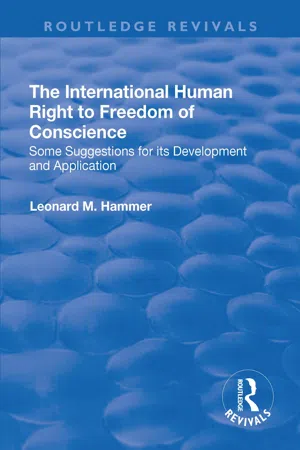History
Conscientious Objector
A conscientious objector is an individual who refuses to participate in military service or war on the grounds of moral or religious beliefs. Throughout history, conscientious objectors have faced challenges and discrimination for their refusal to bear arms, often advocating for alternative forms of service or conscientious objection provisions in military conscription laws.
Written by Perlego with AI-assistance
Related key terms
2 Key excerpts on "Conscientious Objector"
- eBook - ePub
- Marjorie Cohn, Kathleen Gilberd(Authors)
- 2009(Publication Date)
- NYU Press(Publisher)
Conscientious objection has a long and honorable history in the American military, with cases going back to the colonies and the Revolutionary War. Through litigation and public pressure, COs have expanded the definition of conscientious objection and the rights of CO applicants over the years, forcing the military to recognize a wide range of religious and moral beliefs as a basis for objection and to treat objectors with some measure of respect and dignity. Soldiers and sailors like those discussed in this chapter have demanded that the military obey the courts and its own regulations. These objectors’ efforts have helped to protect and expand GIs’ rights in other discharges and dissent as well.Defining a Conscientious Objector
Our law has a well-established procedure for becoming a Conscientious Objector. The Supreme Court in United States v. Seeger quoted Chief Justice Hughes, who said that “in the forum of conscience, duty to a moral power higher than the State has always been maintained.”1Under Department of Defense and service regulations, the military must grant CO status to any service member who is conscientiously opposed to participation in war in any form, whose opposition is founded on religious training and beliefs, and whose position is sincere and deeply held.2 - eBook - ePub
The International Human Right to Freedom of Conscience: Some Suggestions for Its Development and Application
Some Suggestions for Its Development and Application
- Leonard M Hammer(Author)
- 2018(Publication Date)
- Routledge(Publisher)
One may glean from the aforementioned examples of selective conscientious objection that the objection is possible to administrate. Nevertheless, the aforementioned instances of selective conscientious objection pertained to situations where the objector essentially relied on predetermined normative standards, such as violations of humanitarian norms or legislative provisions regarding the use of nuclear weapons. Hence while the ability for some form of selective conscientious objection is recognised, it is in a limited format and not based on the deference towards an individual’s conscientious belief.Upon considering the basis for military conscientious objection as recognised by international fora, the ability to rely on the right to freedom of conscience, and therefore manifest one’s conscientious belief, should equally apply to the selective Conscientious Objector. An objector to involvement with nuclear weapons, or whose conscientious belief prevents the destruction of the environment, should maintain the ability to manifest such beliefs. Included in such a manifestation would be the selective conscientious objection to carry out actions that are contrary to a belief. The individual has made a determination regarding what is deemed important and central to one’s existence, such as not being involved with nuclear weapons, that mandates the inability to conduct certain actions. The conscientious belief reflects an inherent qualitative discrimination for the individual objector such that even if the objection is not necessarily to the military or even to the use of arms, the action being/called upon to perform would lead to a violation of a conscientious belief. Considering that the importance of a conscientious belief is not merely its existence but also its application to specific instances, the application also should entail instances of selective conscientious objection. Along with the reliance on the right to freedom of conscience as a basis for the military Conscientious Objector comes the entire package associated with the right to conscience. That would include not only beliefs that are wholly opposed to using firearms or force, but also other individual conscientious beliefs that prevent the individual from participating in various military actions. The evaluation should not solely be the effects of the objection on the military but rather that the demanded actions entail a violation of a conscientious belief. That is in essence the basis for the right to military conscientious objection and seems equally to apply to selective conscientious objection.
Learn about this page
Index pages curate the most relevant extracts from our library of academic textbooks. They’ve been created using an in-house natural language model (NLM), each adding context and meaning to key research topics.

